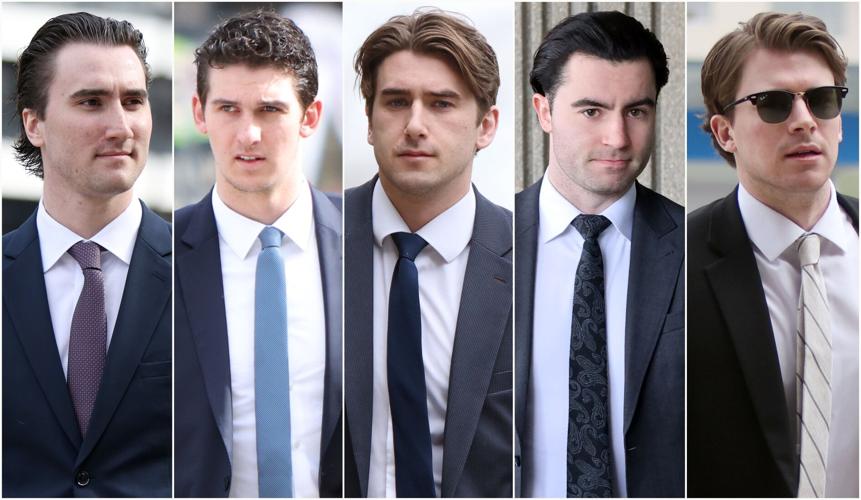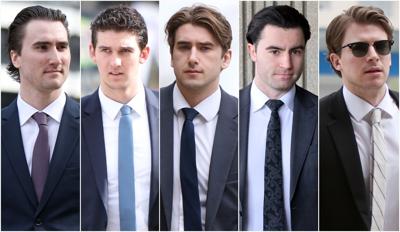The high-profile Hockey Canada sexual assault trial will continue as a judge-alone trial after the jury was dismissed Friday following a complaint that multiple jurors felt that two defence lawyers appeared to be making fun of them.Ìę
Following agreement by the Crown and defence, Superior Court Justice Maria Carroccia will continue to hear the trial without a jury, meaning witnesses who have already testified â including the complainant who wrapped her testimony Wednesday after nine days on the stand â will not have to come back.Ìę
Michael McLeod, Alex Formenton, Dillon ¶ÙłÜČúĂ©, Carter Hart, and Cal Foote, all members of the 2018 Canadian world junior championship team, have pleaded not guilty to sexually assaulting the then-20-year-old woman in a room at the Delta Armouries hotel in London, Ont. in the early hours of June 19, 2018.Ìę

Alex Formenton leaves the courthouse in London, Ont. on Friday, May 2, 2025 with his lawyers Daniel Brown, left, and Hilary Dudding, right.Ìę
Geoff Robins THE CANADIAN PRESSCarroccia said Friday that it was with âreluctanceâ that she concluded the trialâs fairness had been compromised, and the jury had to be discharged.Ìę
âMy concern is that there is a possibility that several members of the jury harbour negative feelings about certain counsel that could potentially impact upon their ability to fairly decide this case,â Carroccia said in her ruling Friday.
âIt is reasonable to conclude that in this situation, negative feelings about counsel and how they conduct themselves might impact the juryâs perception of the accused. This would obviously compromise the fairness of the trial.âÌę
The shocking turn of events began Thursday morning as Carroccia came back into the courtroom following the recess, telling the lawyers she had received a note from one juror, which said that âmultiple jury members feel we are being judged and made fun ofâ by Formentonâs lawyers, Daniel Brown and Hilary Dudding.Ìę
An apparent misunderstanding between a juror and a defence lawyer caused the mistrial in the Hockey Canada case.Ìę
An apparent misunderstanding between a juror and a defence lawyer caused the mistrial in the Hockey Canada case.Ìę
âEvery day when we enter the courtroom they observe us, whisper to each other, and turn to each other and laugh as if they are discussing our appearance,â said the note.
âThis is unprofessional and unacceptable.â
Brown said he was âshocked and upset to be at the centre of this,â and was concerned with the jurorsâ impression.
âItâs something I didnât do and I wanted the court to specifically know I did not do,â he told the judge in the juryâs absence.Ìę
Dudding echoed Brownâs comments, saying âItâs a difficult thing to have this happen.â
Carroccia said she herself hadnât noticed anything problematic when looking at the lawyers and their clients, otherwise she would have mentioned it.Ìę
âSo I donât know where itâs coming from,â she said, regarding the jurorsâ concerns.Ìę
Brown suggested that daily protests happening outside the courthouse during the nine days the complainant testified, coupled with personal attacks on the defence lawyers on social media, may have âaffected the jury and perhaps led them to believe things that arenât accurate.â
In a statement to media on Friday, Brown and Dudding said this was a âregrettable developmentâ as their client very much wanted to be judged by a jury of his peers.Ìę
âWe, his counsel, found ourselves involved in the unusual chain of events that led to this outcome,â they said.Ìę
âNo defence counsel would risk alienating a juror, and nothing could be further from the truth in this instance. While it is true that co-counsel will speak with one another from time to time during a trial, this is commonplace. The very idea of counsel making light of a juror is illogical and runs directly counter to our purpose and function.â

Protestors outside the courthouse in London on Friday.
Geoff Robins/THE CANADIAN PRESSThe Crown had also wanted to continue with a jury, Crown attorney Meaghan Cunningham told the judge on Friday. But given Carroccia’s decision, the prosecution was left with two of what Cunningham described as âundesirable optionsâ: press on with a judge-alone trial after having presented most of their case to a jury, or start over from scratch with a new jury.Ìę
âWe quite obviously prefer the one that doesnât cause further harm, or doesnât further traumatize (the complainant),â Cunningham said.Ìę
âAnd so in light of Your Honourâs ruling, the Crown will now consent to re-election and continue this case judge-alone in front of Your Honour, and we are prepared to continue with the evidence.â
Carroccia thanked the jury for their service as she dismissed them Friday morning, and the trial immediately resumed before Carroccia, with player Tyler Steenbergen continuing his testimony about what he saw in the hotel room on June 19, 2018.Ìę
“I have determined in this case that it is appropriate to discharge the jury,” the judge told the jurors. “I know that you have invested four weeks in this trial and certainly you have the thanks of myself, court staff, and counsel for the time and effort that you have put into this matter, but the jury will be discharged. So I thank you and you are free to go.”Ìę
Dudding was also involved in the first trial resulting in a mistrial last month, after a juror at the first trial reported that Dudding spoke to her during the lunch break. Juror No. 4 also told other jurors about it, with one saying she thought the encounter was inappropriate. While there were conflicting reports about what was actually said between Dudding and Juror No. 4, Carroccia declared a mistrial last month after finding one or more jurors may now hold negative feelings toward the defence.Ìę
In pushing for a second mistrial this week, Hartâs lawyer Megan Savard said that the jurorsâ comments about being mocked âis, if anything, a worse form of jury tainting against the defence than we saw the first time around.
âWe know itâs worse than last time.âÌę
The case for a second mistrial
In pushing for a mistrial on behalf of the five defence teams during legal arguments on Thursday, Savard said they were prepared to then select a judge-alone trial before Carroccia, so that the case could keep moving forward. While the defence was content with selecting a new jury last month after the first mistrial, this time things were different, Savard pointed out, as the complainant and a number of other witnesses had already testified.
She said the negative belief that one or more members of the jury may hold toward some of the defence lawyers âwill attach to everyone on this side of the courtroom,â leading to an unfair trial for the five accused men.Ìę
And she said she personally felt a âchilling effectâ after the juryâs note was delivered; she pointed out that when the jury walked back into the courtroom Thursday afternoon, she and the rest of the defence lawyers looked straight at Carroccia rather than at the jury as they normally would.Ìę
âEvery single one of us, I will say, was afraid to look at the jury,â she said. âAnd so thereâs that sense, not just on behalf of counsel for Mr. Formenton, but on behalf of all of us, that we may be next if there is in fact this tendency to misinterpret innocuous conduct as nefarious.â
Cunningham pushed to keep the jury, arguing instead to ask the jurors questions about the issue and determine who could remain impartial in judging the case. If enough impartial jurors were left out of the 14-person jury, Cunningham suggested the judge give them an instruction to put the issue out of their minds.Ìę
As of Thursday afternoon, she said she wasnât prepared to consent to the case proceeding before Carroccia alone, saying the Crown had built its case knowing it was presenting to a jury, and would have done things differently had it been before a judge, though she didnât specify what.Ìę
âI know Your Honour has enough experience to know that the Crownâs decision in this respect is not a personal reflection of anything,â she told Carroccia.Ìę
Cunningham highlighted that the Crown was nearing the end of its case, having been presented to a jury, while the defence, should they choose to call any evidence, would get to present to a judge, âwhich I think is a very different situation than presenting evidence to a jury,â she said.Ìę
âWe fear that this would potentially cause prejudice to the Crownâs case, to the Crownâs ability to sort of conduct its case in a complete and fair manner,â Cunningham said.Ìę
In her ruling Friday, Carroccia stopped short of declaring a mistrial, but nevertheless found that the jury should be discharged. She found that an inquiry of the jury would be insufficient to remedy the problem.Ìę
âIt would be difficult to conduct an inquiry that would adequately address the issue raised without asking the jurors to reveal their opinion of that lawyer,â she said. âTo do so might impact trial fairness and exacerbate the situation rather than remedy it.â
The Starâs in-depth reporting of the trialÌę
After the first trial ended in a mistrial, the second trial began on April 28, with the Crown once again providing their opening statement. Aside from the complainant, whose identity is covered by a standard publication ban, the second jury had also heard from a London police detective testifying about surveillance footage and fromÌęplayers Taylor Raddysh and Boris KatchoukÌęabout what they saw when they were briefly in the hotel room.Ìę
The complainant had met McLeod at Jack’s Bar and returned to his hotel room where they had consensual sex, only for multiple men to come in afterward.ÌęDuring days of graphic testimony, the complainant alleged that the men laid a bedsheet on the floor and asked her to fondle herself on it, to perform oral sex on them as she was slapped and spat on, and to have vaginal intercourse.Ìę
While she never said no nor physically resisted, the complainant testified that she went into “autopilot” mode, as her mind separated from her body and she engaged in the sexual activity. She said she adopted a “porn star persona” as a coping mechanism while in a room surrounded by men she didn’t know and who should have known she wasn’t consenting.Ìę
The Crown has alleged that McLeod had intercourse with the complainant a second time in the hotel roomâs bathroom; that Formenton separately had intercourse with the complainant in the bathroom; that McLeod, Hart, and ¶ÙłÜČúĂ© obtained oral sex from the woman; that ¶ÙłÜČúĂ© slapped her naked buttocks, and that Foote did the splits over her head and his genitals âgrazedâ her face.Ìę
Before being dismissed on Friday, the jury had started hearing testimony from Steenbergen, who said he heard the womanÌędemanding to have sex with playersÌęin the room, and witnessedÌęDube slap her naked buttocks and “partially” saw FooteÌędo the splits over her while she was on the ground.Ìę
































